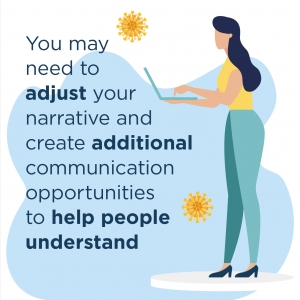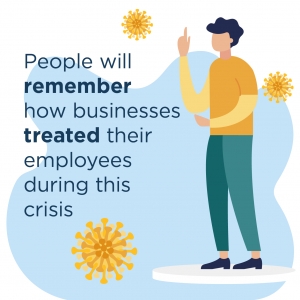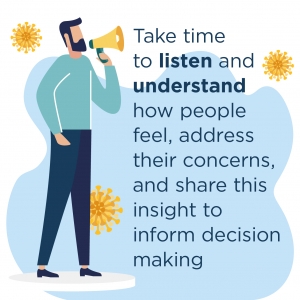How to manage change in a time of crisis
Communicating a major change programme is challenging enough without factoring in a global pandemic.
For many organisations, pressing pause on certain projects hasn’t been an option – let’s face it you don’t embark on major change programmes unless it’s integral to business success, not to mention we have no idea when this crisis will end. But forging ahead as your employees adapt to new ways of working against a climate of fear and uncertainty, is no mean feat.
This is the position many internal communicators find themselves in, especially now that the initial frenzy of coronavirus has calmed down and organisations have put measures in place to support workers during these surreal times. Change programmes are coming back into focus but that’s not to say that we can just pick up from where we left off in March.
Covid-19 isn’t going anywhere, and we won’t be returning to normal anytime soon. So, how do we communicate crisis and change simultaneously in a world that looks and feels very different? Here our three top tips to consider:
Adjust the narrative
With any change programme, it’s important to have an overarching rationale that people can understand and buy into. And it’s even more important now to put it in the context of Covid-19.
You may need to adjust your narrative and create additional communication opportunities to help people understand why your change programme is going ahead and why it’s going ahead right now.
For some, the pandemic may have provided a perfect case study for why being able to adapt and change is a key part of doing business. Covid-19 has dragged many organisations kicking and screaming into the 21st century – there’s been no option but to enable remote and flexible working and to implement new technologies that were previously seen as too risky.
As internal communicators, we have an opportunity to demonstrate why change is necessary – we can’t predict the future, but we can put ourselves into the best position to respond to what may come our way. That’s a powerful argument for change and we are living with the reality of that right now.
And let’s not forget to thank people for their willingness to adapt and acknowledge what was collectively achieved in a very short period of time.
Be prepared to challenge
There are many different types of change programmes and there are some that need to be handled very carefully right now. People will remember how businesses treated their employees during this crisis, and while some decisions are unavoidable, it would be remiss for internal communicators to not raise reputational risk when required.
Alignment with our external colleagues and strong relationships with senior stakeholders is critical as we navigate the next few months. We have a real moment to be heard – the results of poor communication are hitting the headlines every day and now more than ever, leadership will be looking to us for guidance and insight – now is the time for us to step forward, be bold and to challenge.
Take the time to listen
We’re all familiar with the Kubler-Ross change curve and present thinking is that people don’t simply follow the curve step by step but move back and forth, often multiple times as they adjust to change.
For some of us, it can feel like the pandemic has been going on forever and it’s time to move our focus back to key projects and programmes, for example a restructure that will create more efficient ways of working or implementing a new technology that will differentiate you in the market. Whatever it is, it could be viewed as a welcome distraction and a sign that things are returning to normal.
But for others that might not be the case. For many, the last few months have involved illness, fear, grief and isolation. They might not be ready to go back to ‘normal’ (if such a thing exists anymore!) just yet.
This is where employee voice is essential. Take time to listen and understand how people feel, address their concerns, and share this insight to inform decision making. It’s not to say that existing change programmes should cease to exist, but that the messaging around them needs to be handled carefully and sensitively.
There are plenty of change models, frameworks, books and courses, etc that we can refer to but it’s worth mentioning that sometimes we just have to roll with what each day brings and do the best we can.
And that’s not meant to sound defeatist – simply realistic. We’re in the midst of a crisis that may last years and information changes by the minute. And when you’re working in a global organisation where governments around the world are all handling the situation differently, it presents a whole new set of challenges.
So, try to take a breath – you’re doing a great job and without internal comms, organisations would be in a far worse place right now.
Helen Deverell for Alive with Ideas
















